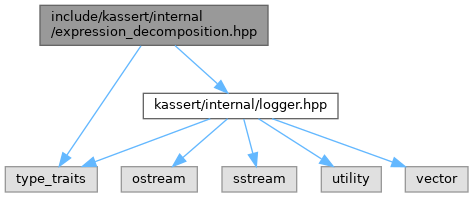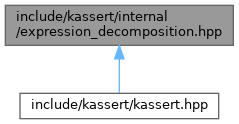|
kassert
1.0.0
Assertion library for KaMPIng
|
|
kassert
1.0.0
Assertion library for KaMPIng
|
Expression decomposition. More...


Go to the source code of this file.
Classes | |
| struct | kassert::internal::AlwaysFalse< T > |
| Type trait that is always false, to implement static_asserts that always fail, thus preventing a template function from being instanciated. Used to forbid calling the overloads of && and ||. More... | |
| class | kassert::internal::Expression |
| Interface for decomposed unary and binary expressions. More... | |
| class | kassert::internal::BinaryExpression< LhsT, RhsT > |
| A decomposed binary expression. More... | |
| class | kassert::internal::UnaryExpression< LhsT > |
| Decomposed unary expression. More... | |
| class | kassert::internal::LhsExpression< LhsT > |
The left hand size of a decomposed expression. This can either be turned into a BinaryExpr if an operand or relation follows, or into a UnaryExpr otherwise. More... | |
| struct | kassert::internal::Decomposer |
| Decomposes an expression (see group description). More... | |
Functions | |
| bool | kassert::internal::finalize_expr (bool const result) |
| If an expression cannot be decomposed (due to && or ||, to preserve short-circuit evaluation), simply return the result of the assertion. | |
| template<typename ExprT > | |
| decltype(auto) | kassert::internal::finalize_expr (ExprT &&expr) |
Transforms LhsExpression into UnaryExpression, does nothing to a Expression (see group description). | |
Expression decomposition.
Failed assertions try to expand the expression similar to what Catch2 does. This is achieved by the following process:
In a call
KASSERT() also prints the values of rhs and lhs. However, this expression expansion is limited and only works for expressions that do not contain parentheses, but are implicitly left-associative. This is due to its implementation:
is replaced by
which is interpreted by the compiler as
where the first <= relation is overloaded to return a proxy object which in turn overloads other operators. If the expression is not implicitly left-associative or contains parentheses, this does not work:
is replaced by (with implicit parentheses)
Thus, the left hand side of && can only be expanded to the result of rhs2 == lhs2. This limitation only affects the error message, not the interpretation of the expression itself.
If an expression cannot be decomposed (due to && or ||, to preserve short-circuit evaluation), simply return the result of the assertion.
| result | Result of the assertion. |
| decltype(auto) kassert::internal::finalize_expr | ( | ExprT && | expr | ) |
Transforms LhsExpression into UnaryExpression, does nothing to a Expression (see group description).
| ExprT | Type of the expression, either LhsExpression or a BinaryExpression. |
| expr | The expression. |
Expression.